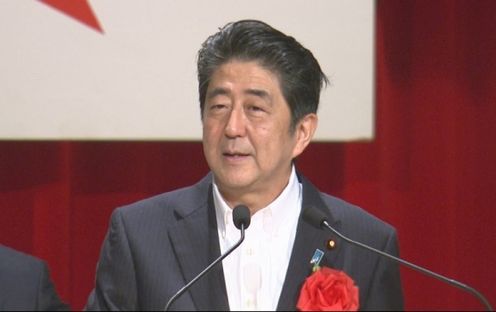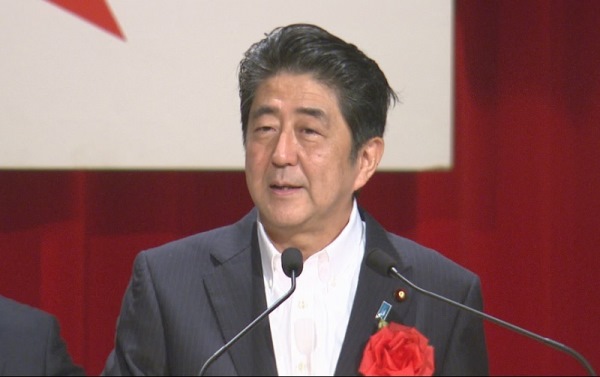Home > News > The Prime Minister in Action > September 2016 > The General Meeting of the Japan Chamber of Commerce and Industry
The Prime Minister in Action
The General Meeting of the Japan Chamber of Commerce and Industry
September 15, 2016
[Provisional Translation]
Prime Minister Shinzo Abe attended the 124th General Meeting of the Japan Chamber of Commerce and Industry held in Tokyo.
The Prime Minister said in his address,
“Thank you very much for inviting me to today’s 124th General Meeting.
Because of all of your support throughout Japan, we, the coalition of ruling parties, have been able to obtain the most stable postwar political base in the House of Councillors. We are aware of the seriousness of this responsibility, and are resolved to address each and every issue that we face with greater diligence than ever before.
Yesterday I visited Hokkaido to observe the damage done by Typhoon No. 10. Again, I offer my prayers for the repose of those whose lives were lost in the recent typhoons, and my condolences to all those affected by these disasters. I saw for myself the ravages of the typhoon, and heard directly from the local people of their hardship and concerns. Tomorrow we will designate this as a ‘Disaster of Extreme Severity.’ In line with our policy of doing everything that is possible, we will extend our full efforts in the restoration and reconstruction of the affected areas, while remaining sensitive to the feelings of all the affected people, including those in Iwate, which I was unable to visit yesterday because of the inclement weather.
It is in times of disaster in particular that mutual regional assistance, through the Japan Chamber of Commerce and Industry, plays a powerful role.
On the occasion of the Kumamoto Earthquake in April, in order to respond to the various requests from business operators who had been affected by the earthquake, 67 support staff members from 52 Chambers of Commerce and Industry throughout Japan were dispatched to the Kumamoto Chamber of Commerce and Industry in the affected area. As a result, through the establishment of special consultation offices and other measures, you have thus far provided detailed consultations for about 5,000 cases, thereby supporting those in the disaster-stricken area. The Government will also exert its full efforts for reconstruction, until the day comes when the magnificent Kumamoto Castle, the symbol of Kumamoto, once again stands proudly over the city.
Five and a half years have now passed since the Great East Japan Earthquake. At the end of last month, for the first time since the disaster, we compiled our approach on the handling of the zones where the return of residents would be difficult. ‘There can be no revitalization of Japan without the reconstruction of Tohoku.’ We will eliminate vertical segmentation and thoroughly engage in reconstruction, while continuing to listen to the views of the local people.
We will face up to the risks confronting the global economy, and take all policies necessary. Agreement was reached on this at the G7 Ise-Shima Summit and at the G20 Summit held last week.
During the extraordinary Diet session this autumn, we will submit a supplementary budget for strong economic measures exceeding 28 trillion yen in project scope. We will work for the early enactment of this budget in order for all of you to make bold investments for the future.
It is the SMEs that support Japan’s economy. It is only when the SMEs are active and well that Japan itself is also active and well.
We will strengthen the earning power of ambitious SMEs with growth potential. In July this year, the Act on Strengthening the Management of Small and Medium-Sized Enterprises was enacted, which will halve the fixed asset tax on new capital investment. With the support of the Japan Chamber of Commerce and Industry, we have already certified close to 500 cases of management improvement plans. We will expand support measures for the certified companies, such as the provision of a low-interest financing system.
We will also exert our full efforts in improving the conditions for subcontractors. At the end of the last financial year, we conducted a large-scale survey and, based on the results, held separate hearings for each main industry. In order to actually improve the issues related to business practices that were identified in the survey and hearings, we will strengthen the implementation of the Act against Delay in Payment of Subcontract Proceeds, Etc. to Subcontractors and the Act on Prohibition of Private Monopolization and Maintenance of Fair Trade and enhance the guidelines for each industry.
We will firmly implement these measures to ensure steady results, starting with spreading them among the members of the Japan Chamber of Commerce and Industry.
Reform of working styles is a priority issue for the Abe administration.
We will reform systems in order to correct long working hours. We will create environments in which it is easy for women and the elderly to work, with the anticipation that this will lead to improved corporate productivity.
Furthermore, we will improve the treatment of workers in irregular employment through such efforts as legal revisions to achieve equal pay for equal work. Through this, consumption will expand and diverse workstyles will become possible.
I realize that, for SMEs with a shortage of staff and that are struggling to meet deadlines, this may be no simple matter. However, the Government will strive to enhance the environment to facilitate the implementation of such measures for you, and I sincerely request your kind cooperation.
I believe that by advancing such reforms in workstyles, together we can shape Japan’s future.
On September 12, we held the first meeting of the Council on Investments for the Future, which will be the new control tower for our Growth Strategy.
By incorporating into society the remarkable technological revolution of recent years, we will improve corporate productivity, while enhancing the lives of the people. I would like to consider specific measures to achieve this in conjunction with all of you.
Here I would like to introduce one example. Productivity at construction sites is a field in which there is still much room for improvement. We intend to increase this productivity by 20% by 2025. To that end, within the next three years, we will introduce surveying drones and other cutting-edge technology at public construction sites where bridges, tunnels, and dams are being built, tie together the entire construction process, from construction to inspections, using three-dimensional data, and introduce new construction methods. This will act as a substitute for site work usually done by people, and make it possible for workers to gain knowledge in a matter of months that would normally take many years to acquire. We will change the image people have that construction work is difficult, dirty, and dangerous, and work to attract diverse human resources to the sector. In doing so, we will alleviate issues related to a lack of workers. It is my hope that small- and medium-sized construction sites across the country will change dramatically as well.
I am convinced that, although the economies of emerging countries have slowed down compared to previously, opportunities will definitely arise as different kinds of products and services are developed to meet the needs of the middle class.
The Trans-Pacific Partnership (TPP) will enhance free and fair competition that correctly evaluates the values of goods and services. Under new rules, farmers and SMEs can play a major role by boldly taking on the challenge of overseas markets, with their special regional products and unique technologies. We have high expectations of measures to support the overseas development of agricultural goods and products made by SMEs.
In the past, when Japan’s SMEs entered emerging economies, they often experienced various concerns, such as worrying about whether the rules would be changed without warning, or taxation laws would suddenly change, or corporate harassment might occur. However, in the future, among the countries participating in the TPP, there will be an environment protected by fixed rules thoroughly in place. In this context, I am convinced that a wide open path will emerge for entry into overseas markets, which previously only major corporations could achieve, for SMEs that have made products with added value, or that have special technologies.
However, since it is nevertheless difficult for SMEs to enter a new market, I would like the Japan Chamber of Commerce and Industry to offer its assistance at such a time, while the Government will also provide thorough support.
At the upcoming extraordinary session of the Diet, the Government will work as one to strive to obtain early Diet approval of the TPP agreement. I would like Japan to take the lead and build momentum for its early entry into force.
At the Rio Olympics that took place recently, the performances of the Japanese athletes on the other side of the world provided a great deal of excitement for Japan. As well as feeling pride as a fellow Japanese person, I would also like to offer my heartfelt praise for the wonderful achievements of the athletes. Last week the Paralympic Games were opened, and they too have been featuring intense competition every day.
In 2020, four years from now, Japan will be the stage of the Olympic and Paralympic Games. In the lead up to the Tokyo Olympic and Paralympic Games, we expect that even more foreign tourists will visit Japan.
I would like to spread this opportunity for Japan throughout the country, not only Tokyo.
For example, Lake Biwa and Kyoto can be joined by boat. Several Chambers of Commerce and Industry are collaborating to develop tourism routes over wide-ranging areas. We look forward to tourists being able to visit many different tourist spots.
To enable overseas visitors to have a more enjoyable experience, we will accelerate the improvement of infrastructure. We will improve harbors so that large-scale cruise ships can dock there, and strengthen the functions of airports in regional areas and in the Tokyo metropolitan area. The Superconducting Maglev (SCMAGLEV) Chuo Shinkansen will be established a maximum of eight years ahead of schedule, and we will accelerate the construction of other Shinkansen lines.
Through the realization of a corridor for vitalizing local regions that unifies all of Japan into one economic zone as soon as possible, I would like foreign visitors to fully discover the appeal of Japan’s regions, where there are many things that cannot be found in Tokyo.
Through the vitality of our SMEs, the Japanese economy will grow.
Chairman Mimura, who was formerly a champion of the steel industry, has now become the boss in charge of the nation’s SMEs. I look forward to the continued activities of the Japan Chamber of Commerce and Industry for the development of the regional economies under Chairman Mimura’s leadership.
Finally, I would like to end my remarks by expressing my wish for the further development of both the Japan Chamber of Commerce and Industry and each Chamber of Commerce and Industry branch, as well as extending my best wishes to everyone in attendance. Thank you.”


